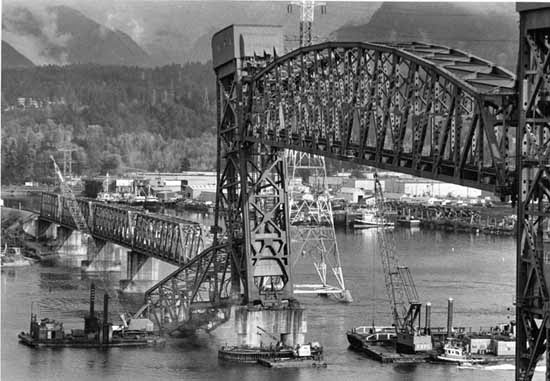I can remember this event well The 1979 collison from a Oil tanker (scroll down in the story ) with the span, which put it out of service for many months.
This was a very close call in 1979 with the MV Japan Erika, that many people have totally forgoten about (I have some pictures taken from the water of this accident, I will have a look for them soon, and post some of them up. Rare close up views).
Some earlier accidents, and by no means complete either.
Damage to Second Narrows bridge by the Calmar Shipping Lines, "Losmar".
Photo: Leonard Frank, 3 May 1930. Van. Library 12357
Photo: Leonard Frank, 3 May 1930. Van. Library 12357
Damage to Second Narrows bridge by the Calmar Shipping Lines, "Losmar".
Photo: Leonard Frank, 3 May 1930. Van. Library 12358
Photo: Leonard Frank, 3 May 1930. Van. Library 12358
S.S. "Losmar", after knocking down a span of the Second Narrows bridge. April 1928.
Photo: donated by C.M. Rolston. Van. Archives A24374
Accident "Norwich City" collision with Second Narrows bridge 23 April 1928
Van. Archives A00490
Accident "Pacific Gatherer" collision with Second Narrows bridge. Tug "Lorne" standing by.
Photo: Stuart Thomson 19 September 1930. Van Archives A00818
Accident "Pacific Gatherer" collision with Second Narrows bridge, 19 September 1930.
Tug "Lorne" standing by. Photo: Stuart Thomson. Van Archives A00820
Aerial view of Burrard Inlet. ca. 1942-1945. Cropped slightly, note how the inlet narrows here, a perfect place for a bridge, the Iron Workers Memorial bridge will not be finished until 1960.
Photo: R.C.A.F. Van. Archives A66600
Province Newspaper, Second Narrows bridges. Van Library 39713
Nothing much has changed here, the bridge was fixed from the 1979 incident, studies were generated as usual but not much done, other than tugs now assist ships through the area, BUT the ships, especially when combined with the weather, tides, etc, are far more powerful than the tugs can sometimes control.
( personal experience )
Groups like Burke Mountain Naturalists (BMN), Raincoast Conservation Foundation, (RCF),
Conversations for Responsible Economic Development, (CRED) and Pipe-up
among many others are spearheading the opposition to expansion of this type of traffic through the Port of Vancouver. Contact the groups and also your local M.P., M.L.A. and local politicians and voice your concerns.
UPDATE: As promised above, a few pictures of the 1979 incident, these have never been seen in public.
Eastern side of Second Narrows bridge, 1979 (Flickr pic)
Western side of Second Narrows bridge, 1979 (Flickr pic)
Southern pier of the Second Narrows train bridge, 1979 (Flickr pic)
Southern pier of the Second Narrows train bridge, 1979 (Flickr pic)
Northern pier of the second Narrows train bridge, 1979 (Flickr pic)
Marine cranes at work… Repairs to the heavily damaged Canadian National Railway bridge across Burrard Inlet resumed Monday when workers returned to their jobs after a work stoppage Sunday. Twenty members of International Association of Bridge, Structural and Ornamental Iron Workers refused to work when they discovered a shim under the northeast leg had come free.
The problem was corrected and the bridge declared safe for continued repair.
The span was knocked out two weeks ago by a Japanese freighter.
photo: Peter Battistoni; Columbian Photo. Record ID 67030
Marine cranes at work… Repairs to the heavily damaged Canadian National Railway bridge across Burrard Inlet resumed Monday when workers returned to their jobs after a work stoppage Sunday. Twenty members of International Association of Bridge, Structural and Ornamental Iron Workers refused to work when they discovered a shim under the northeast leg had come free.
The problem was corrected and the bridge declared safe for continued repair.
The span was knocked out two weeks ago by a Japanese freighter.
photo: Peter Battistoni; Columbian Photo. Record ID 67030
Forest Ethics has created a website to track the local oil tanker traffic
A good way to look at most of the larger vessels transiting the area is to look at Marinetraffic com
which is a better way really to look at the shipping traffic since it gives a better sense of the scale of it, and the traffic congestion in the harbour. Remember there is much more work boat, small boat traffic than the larger ships.














No comments:
Post a Comment